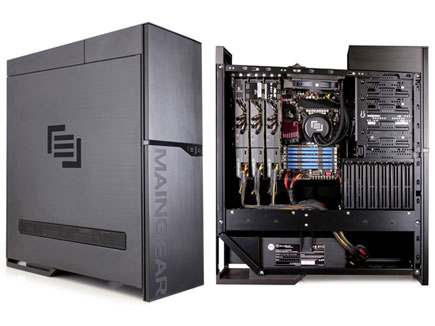Tom's Guide Verdict
The Maingear Shift is an attractive, quiet and highly customizable gaming PC for those who have a big budget.
Pros
- +
Attractive chassis
- +
Strong gaming performance
- +
Cool and quiet
- +
Easy to customize
Cons
- -
Pricey
Why you can trust Tom's Guide
The Maingear Shift is built for gamers who want things their way. This powerful tower ($6,000 as configured, $1,685 starting) can be outfitted with parts as powerful as an Intel Xeon processor and up to three Nvidia GeForce Titan GPUs, with plenty of tool-free options for customizing the machine after purchase. The Shift's sleek design and swappable components offer a first-rate PC gaming experience for those willing to pay the price.
Design
The Maingear Shift is an elegant monster, packing its powerful components within a slick, glossy rectangular case that keeps the bulk of its ports well hidden.
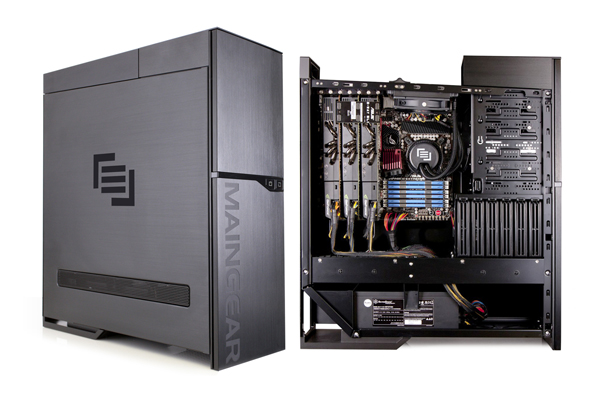
Coated in "Austin yellow" (think mustard meets gold), our unit's front panel opens up to reveal two DVD-RW drives on the top half, with power and restart buttons in the center and the company name embossed vertically along the bottom half.
A window on the Shift's left panel offers a glimpse at our system's neatly laid-out internals, including its Asus X99 motherboard and three Nvidia GeForce GTX 980 GPUs arranged vertically near the top. The system's opaque right panel sports a large Maingear logo in its center, with long ventilation bars on the bottom of both sides.
MORE: Best Gaming Desktops
Measuring 21.5 x 24 x 8.6 inches and weighing roughly 65 pounds, the Shift is ideal for those with lots of room in their command center. The Shift is just about as massive as the 21.4 x 24.8 x 9.75-inch Origin PC Millennium, and slightly smaller than Alienware's triangular, 22.4 x 25.1 x 10.7-inch Area 51.
Ports and Upgradability
The Shift's top panel might look seamless and bare at first glance, but it actually houses all of the machine's ports. A small pop-up panel toward the front opens to reveal two USB 3.0 ports, headphone and microphone jacks, and a FireWire port. You'll also find various memory-card slots, including SD/MMC, MS, XD and CF/MD readers.
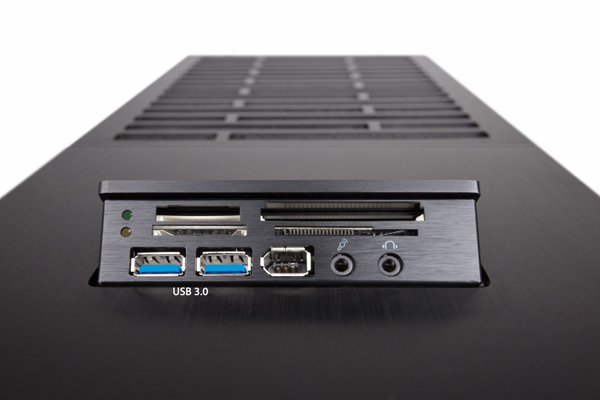
The ventilated second half of the PC's top panel can be screwed off, exposing the bulk of the Shift's inputs. Here, you'll find 10 USB 3.0 ports, one USB 2.0 port, a USB BIOS Flashback port and two Ethernet jacks. The desktop packs a standard suite of audio ports, including line-in, line-out, mic-in, rear output and C/SUB for subwoofers.
Each of the Shift's three GeForce GTX 980 GPUs packs three DisplayPorts, an HDMI port and a DVI port, allowing you to create the multimonitor setup of your dreams.
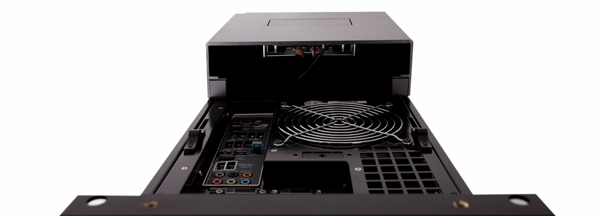
As its name implies, you can easily customize the Shift once you pop open the left and right panels via two switches at the top. Here, you'll be able to tinker with components such as the processor, RAM, graphics cards and fans. You can also utilize the machine's six hot-swap hard-drive bays, which one-up the Origin PC Millennium's five. However, the Millennium's bays can be accessed via a front-facing door and don't require you to open up the machine.
Graphics and Gaming
Armed with three Nvidia GeForce GTX 980 GPUs, our Maingear Shift handled some of today's most demanding games without breaking a sweat.
Middle-earth: Shadow of Mordor looked stunning at 2560 x 1440p and Ultra graphics, from the realistic sunset that fell on Middle-earth to the tiny creases on my character Lithariel's lips. Beheading orcs was a joyously smooth experience at 60 frames per second.
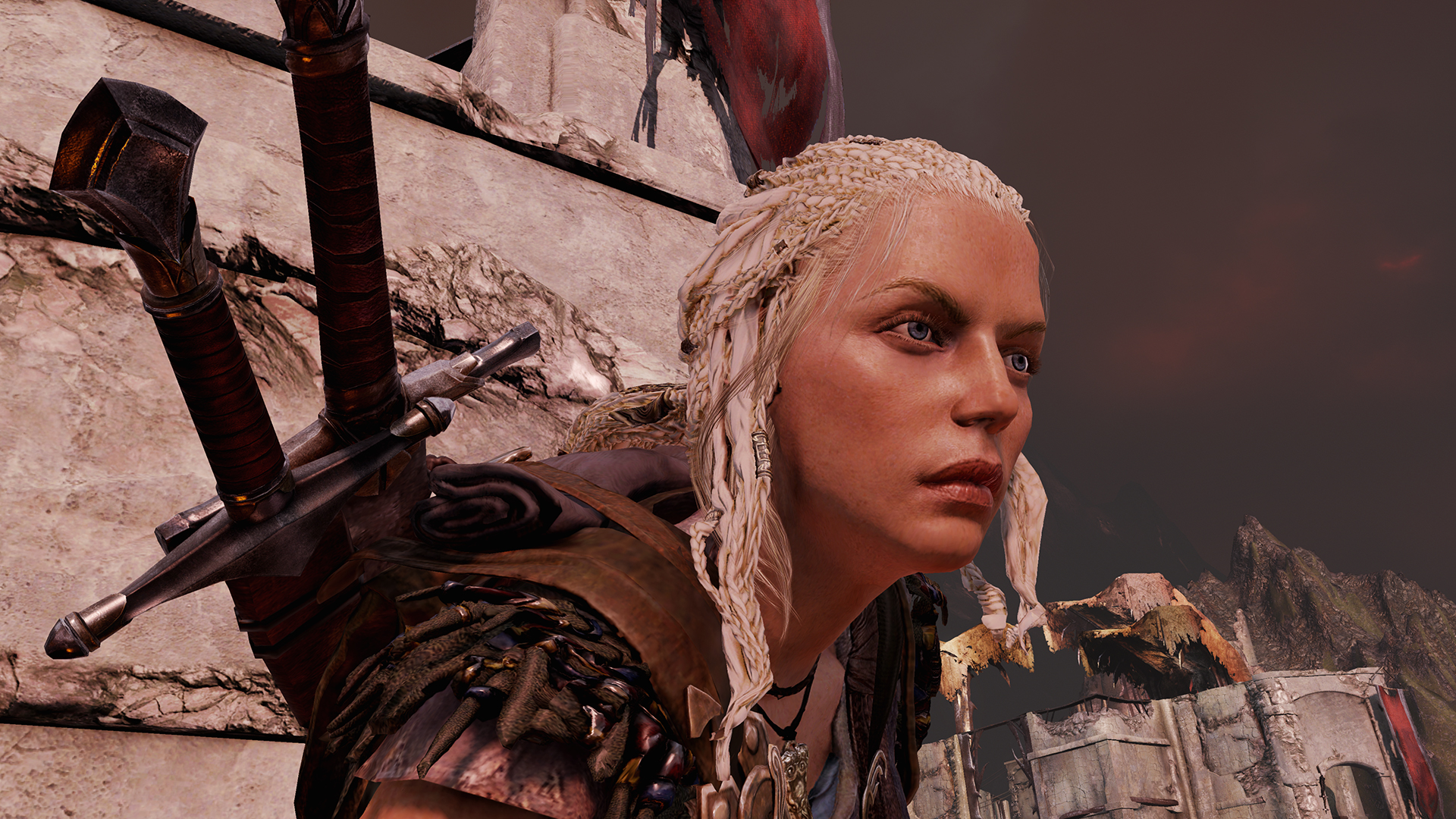
I enjoyed some silky 60-fps free-running through Paris in Assassin's Creed Unity, even as mobs of angry Parisians crowded the beautifully lit game world. The game was a visual treat on the Shift when I played at 2560 x 1440p with Ultra graphics on, though it dipped to an unplayable average of 10 fps when I attempted 3820 x 2160p, or 4K.

The Shift played shooter BioShock Infinite at its full potential, providing some nice sunlight reflection on my machine gun as I bounced around the colorful city of Columbia. Shooting and skyhooking was a thrill at 60 fps and 2560 x 1440 resolution. However, bumping things up to 4K created a nearly unnoticeable difference that wasn't worth the sub-30-fps dips I experienced.
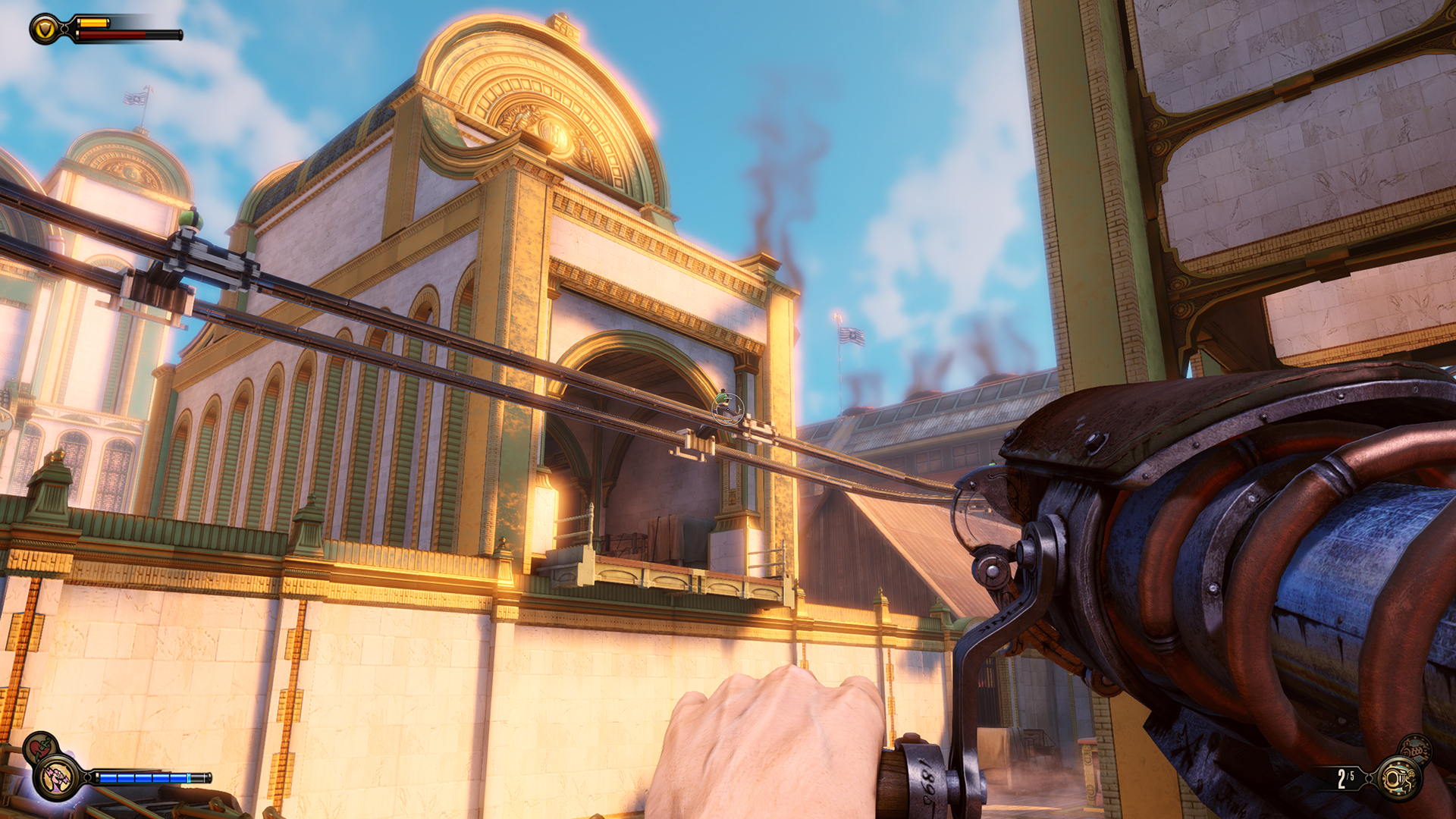
When benchmarking BioShock Infinite at 2560 x 1440p, the game ran at 161 fps on Low graphics and 139 fps on Ultra. In comparison, the Millennium cranked out a much smoother 320 fps and 170 fps on Low and Ultra graphics, respectively.

The gritty, graphically intense Metro: Last Light offered plenty of rich facial detail and satisfying gunfire effects at 2560 x 1600p, and even more at 4K. During benchmarks, the game ran at 118 fps at 4K resolution with graphics on Low, and slowed to a barely playable 28 fps on High. These numbers trounce the Origin's Low and High 4K scores of 84 and 16 fps, respectively.
The Shift's 3DMark Fire Strike Extreme score of 16,141 is neck-and-neck with the Millennium's 16,123, which isn't a surprise, given the desktops' identical GPU layouts. To put this score into perspective, the Digital Storm Bolt II and its single GTX 980 netted a 5,784, which is just below our 6,597 average.
Performance
Packing a 3-GHz Intel Core i7-5960X processor with 8GB of RAM, the Shift proved just as reliable for high-impact computing as it did for gaming. Even with Shadow of Mordor and BioShock Infinite running simultaneously, I was able to surf the Web, stream some Agents of S.H.I.E.L.D. on Netflix and download a game without the PC slowing down.
The desktop notched 32,340 on the Geekbench 3 performance test, falling a bit short of the Intel Extreme Core i7-5960X-powered Millennium (33,950). Both PCs slayed our gaming desktop average of 13,748.
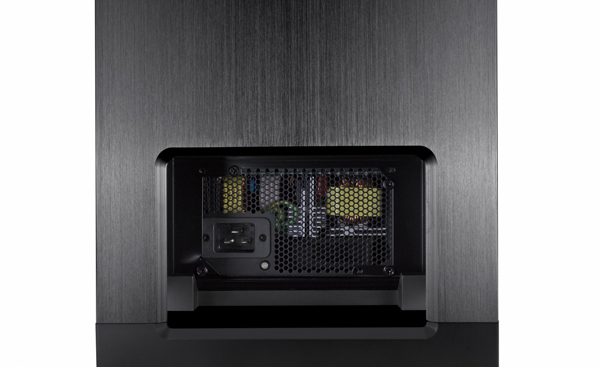
The Shift took 3 minutes and 17 seconds to match 20,000 names to their addresses on our spreadsheet test, outpacing the Millennium's 3:34 and our 3:38 average by a hair.
Featuring a 1TB, 7,200-rpm hard drive with two 250GB SSDs, our Shift unit copied 4.97GB of mixed media at a speedy 318 MBps. That beats the Millennium's already-zippy 221 MBps (4TB hard drive, 1TB SSD), as well as the 106 MBps category average.
Heat and Noise
While many PCs sport fans on their rear or sides, the Shift's top-facing exhaust is designed to complement hot air's natural tendency to rise. Save for a bit of whirring upon startup, this allowed the PC to stay fairly quiet throughout the bulk of my gaming sessions.
After about 20 minutes of hacking my way through Shadow of Mordor in 4K, the Shift let out little more than an unobtrusive hum. Things got louder when I ran multiple games at once while streaming a Netflix video, but that's a scenario you might not often find yourself in.
MORE: Best PC Games Right Now
Packing Maingear's Epic 180 Supercooler, the Shift stays as cool as it does quiet. The only area that became notably hot to the touch was the top panel near the GPUs, but you'll likely have that area covered up.
Software
As is the standard with any GeForce-powered PC, the Shift comes loaded with Nvidia's GeForce Experience app. You can use this software to view your machine's specs, update your drivers and instantly optimize graphics settings for each of your games.
Want to make YouTube clips of your gameplay or stream to Twitch? You can do both with the app's ShadowPlay feature. GeForce Experience also supports GameStream, which lets you stream select games like Titanfall, Dark Souls II and BioShock Infinite to your Nvidia Shield Tablet or Shield Portable.
Configurations
Maingear offers three base Shift configurations that can be customized to your heart's content. The cheapest is the $1,685 AMD model, which starts with an AMD FX 6350 processor, an AMD Radeon R9 260X GPU, 8GB of RAM and a 1TB hard drive.

The next step up is an Intel Z97 config, which starts at $1,770 with an Intel Core i5-4590 CPU, Nvidia GeForce GTX 750 graphics, 8GB of RAM and a 1TB SSHD Hybrid drive. Finally, there's a $2,500 Super Stock X99 unit with a Core i7-5820K processor and 16GB of RAM, with the same graphics and hard drive as the Z97 unit.
MORE: Best Gaming Mice
Once you pick a base model, you'll be able to choose from a variety of processors, graphics cards, motherboards and storage options, as well as cosmetics like paint and lighting colors. As an example of a tricked-out configuration, our $6,000 Shift Super Stock includes an Asus X99 motherboard, a Core i7-5960X CPU, 16GB of RAM, three GeForce 980 GPUs, a 1TB hard drive with two 250GB SSDs and a 24X DVD-RW drive.

The most comparable machine we've gotten our hands on is a $6,399 version of Origin's PC Millennium, which packed the same motherboard, processor, RAM and GPUs, but with a 4TB hybrid drive, a 1TB SSD and a 16X Blu-ray burner. The Z97, AMD and X99 versions of the Millennium start at $1,765, $1,833 and $2,327, respectively, making the lower-end models of the Millennium pricier than those of the Shift, and the higher-end ones more affordable.
Bottom Line
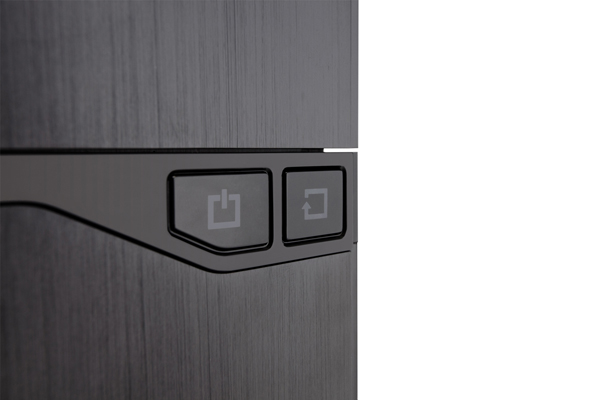
The Maingear Shift ($1,685 starting, $6,000 as reviewed) is a powerful gaming tower that you can trick out to your heart's content. Its seamless chassis makes it an attractive addition to your gaming rig, with a unique top-facing ventilation system that lets it stay cool and quiet throughout long hours of play. Our configuration's Intel Core i7-5960X and three GeForce GTX 980s tore through some notably taxing games, and you can take things even further with up to three GTX Titans for maximum graphics juice.
Origin's massive, similarly priced PC Millennium ($1,765 starting, $6,399 as reviewed) is comparably customizable to the Shift, but offers up to four graphics cards and a choice of motherboard orientation. The Millennium is noisy, though, and unless you're playing in 4K across multiple monitors, you can save hundreds (or, in some cases, thousands), on either machine by settling for dual GPUs at most.
If you've got the cash (and desk space) for a premium PC that offers plenty of customizability both before and after you buy it, the Maingear Shift satisfies.
- Best Gaming Keyboards
- PS4 vs. Xbox One: Which Console Wins?
- 12 Dumbest PC Default Settings (and How to Change Them)
Mike Andronico is an Associate Editor at Tom's Guide. Follow Mike @MikeAndronico and on Google+. Follow us @TomsGuide, on Facebook and on Google+
Mike Andronico is Senior Writer at CNNUnderscored. He was formerly Managing Editor at Tom's Guide, where he wrote extensively on gaming, as well as running the show on the news front. When not at work, you can usually catch him playing Street Fighter, devouring Twitch streams and trying to convince people that Hawkeye is the best Avenger.
